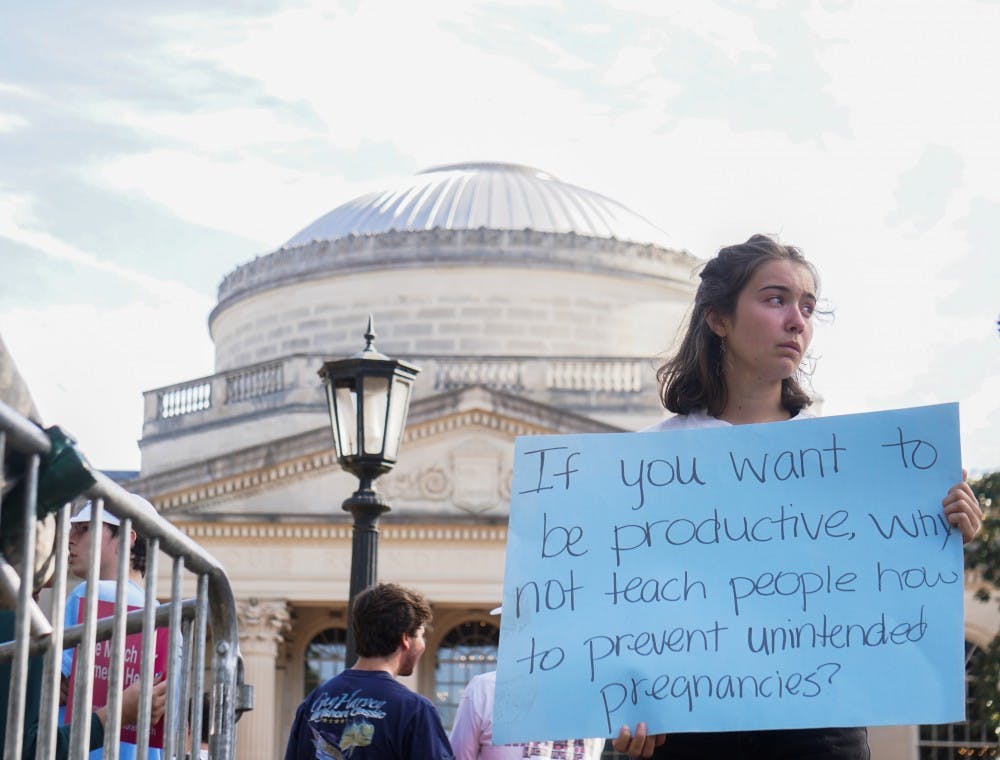Other posters compare abortion to genocide, equating abortion doctors to Nazis and featuring images of the Wounded Knee Massacre in South Dakota and the Rwandan genocide.
“We are here to show the humanity of the pre-born and the inhumanity of abortion and that abortion is an act of violence that decapitates and dismembers small human beings,” Joanna Keilson said, speaking on behalf of the project.
Those with the project handed out pamphlets to passersby that compared abortion to historical genocide, including lynching in the American South and the Holocaust. The pamphlets also featured more graphic images depicting abortions.
Keilson said the group's use of images like these is based on past social reform movements that used strong photographs and drawings to advance their message. She used Martin Luther King Jr. as an example of this.
“Today, abortion happens behind closed doors,” Keilson said. “It’s largely invisible. People are not seeing what’s actually taking place, for the most part, and so we’re here to show — to literally expose — what happens in an abortion.”
The University sent out an email to students and faculty on Friday to notify them about the Genocide Awareness Project’s upcoming presence on campus.
In the email, campus leaders Robert Blouin, Becci Menghini and Jonathan Sauls said UNC routinely allows outside groups to convene on campus to exercise their right to free speech, and that the Genocide Awareness Project had complied with University requirements.
The email said that the exhibit has disturbed community members in the past and encouraged anyone who is upset by this display to make use of the University’s counseling resources.
Both students and faculty took to Twitter to express their disapproval with UNC’s decision to allow the exhibit back on campus.
In a tweet, Little referenced a recent report about sexual assault released by the University. Little said UNC uses resources to "intimidate and physically abuse antiracist student activists" rather than addressing sexual assault on campus.
To get the day's news and headlines in your inbox each morning, sign up for our email newsletters.
Other students were shocked to find this exhibit on campus as they walked to class.
“I thought this was ridiculous, personally,” junior Isaac House said. “But I also just thought it was a little too grandiose and obscene for the message they’re trying to get across.”
House and other students thought the images displayed were inappropriate and disturbing. First-year Mackenzie Beatty said she was horrified when she saw them.
“Access to health care is extremely important, and I think that you shouldn’t shame women for using that access,” she said. “I think that they’re going about this completely wrong, and it’s way too graphic, and it can be very traumatizing for people.”
Beatty, who joined an impromptu counter-protest on Polk Place, said she thinks this is something that the school should stop or at least make less visible to spare students who have had to deal first-hand with this sensitive topic.
Bryant, first-year Julia Clark and first-year Jailyn Neville said UNC shouldn’t have allowed the exhibit on campus. They said the group's use of comparisons to lynching and slavery used to argue their point are especially harmful to Black students.
“Free speech is ultimately a spectrum, and once you get to the end of a spectrum where it’s actually harming people, and it’s making students of color — especially who are already a minority and already under-represented — feel so uncomfortable and so angry on their own campus, that is just unacceptable,” Clark said.
Opinion editor Devon Johnson contributed reporting.
university@dailytarheel.com



